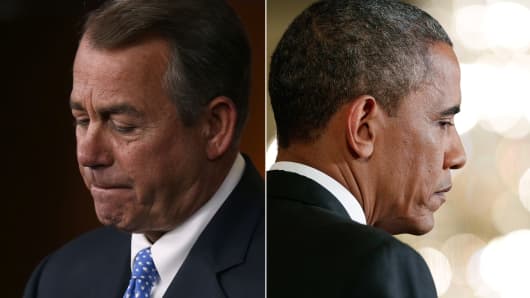Crazy though it may sound to many who are living in the country today, when compared with other struggling nations, America would seem to have emerged from the global financial crisis in half-decent shape.
The unemployment rate has steadily fallen. Household and corporate balance sheets have improved. Structural problems, including long-term unemployment and high student-loan debt, will remain an issue but borrowing costs sank instead of jumping.
The budget deficit, which soared when Washington helped to bail out the financial system after the credit crisis of 2008, has fallen by 80 percent from its peak, and is likely for the next few years to be at its smallest since the country actually turned a surplus in the 1990s.
You might expect America, then, to be exhaling a bit, projecting some authority while trying to hide relief at certain international gatherings where other less advantaged nations are present. You might also expect America to be hurriedly tightening the screws at home, meanwhile, on the financial institutions whose sorry practices sparked the global financial panic in the first place. And expect it to be earnestly tackling the next big challenge—reforming the entitlement system so that the health-care and old-age pension system don't bankrupt the country in the future.
In a way, that is exactly what America is doing right now. Unfortunately, the method is madness.
America's parties are fundamentally split over how the entitlement system should be reformed; Democrats on the left want to fund the current system or even expand upon it by raising taxes; that ensures the size of government will at least be stable, if not growing, steadily larger on a relative basis at a time when much of the country already feels overburdened by regulation, bureaucracy, governmental overreach and oversight by intelligence agencies that crosses into spying.
Republicans, who champion the nation's founding principle of small and limited government, are understandably horrified at such a prospect of expansion, preferring instead to shrink the government as quickly as possible. Lower taxes, less spending and fewer promises made through the entitlement system are outcomes the GOP desires.
The trouble with a compromise that would bridge these differences in order to at least "bend the cost curve," of America's entitlement system is that it is almost by definition impossible to find middle ground between those two ideological positions.
The net result is either a small, suboptimal bleed of government spending (which subtracts from growth in gross domestic product) when the balance of lawmaking power is shifted in the GOP's favor—as it is currently.
Or an expansion of government promises when the balance is shifted in the Democrats' favor—as it was when President Barack Obama pushed his plan for a national health-care system funded in part by higher income and manufacturing taxes to cover the nation's uninsured and no longer refuse coverage to patients with pre-existing problems.
(Read more: US growth in danger as shutdown heads into second week)





